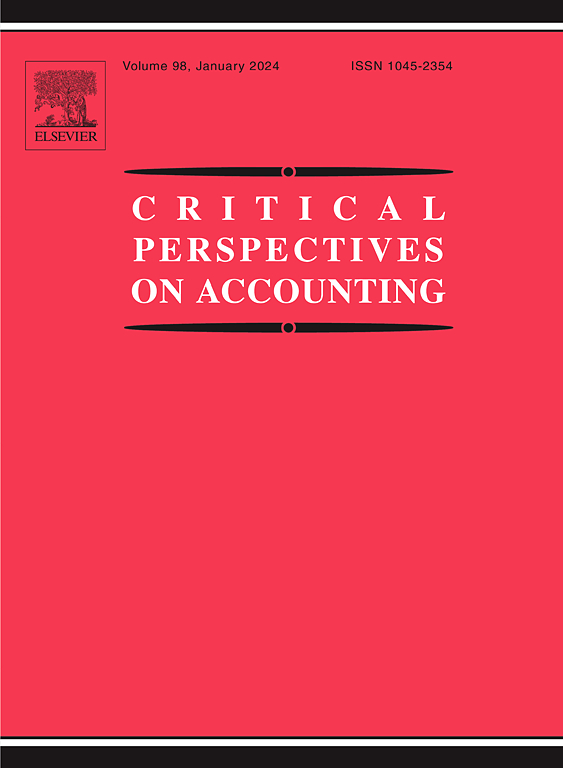Accounting for higher education: Calculative practices in curricular administration
IF 5.7
2区 管理学
Q1 BUSINESS, FINANCE
引用次数: 0
Abstract
Calculative practices resembling conventional accounting and sometimes termed ‘audit culture’ have materialised in higher education to account for learning and related activities. I posit these practices as curricular accounting, thus contributing an unrecognised but very real form of accounting to our discipline. Comparable with other accountings, the processes and practices this one comprises are potentially constituting the people, activities and organisations it involves (i.e., scholars and administrators, teaching and learning, disciplines and universities) as economic actors and entities, with the potential inadequacies and consequences that entails. Thus, my purpose is to increase and distribute knowledge and understanding about curricular accounting to students and academics, among others, to give them agency to allay the inadequacies it holds for them. The paper involves insider research: it reflects my observing and participating in the development and ubiquitous expansion of this accounting from within universities in Britain and Aotearoa New Zealand. Framing the study historically and critically, I treat curricular accounting as a form of accounting, define and configure its aspects, explain its functioning and show that this is another accounting which never simply began. I find that its development connects with student growth, because of demand increasing for university-educated labour, wider access to universities becoming a social policy imperative, and knowledge, discipline-diversification and modularisation expanding. I also find that its recent development and current practice connect with neoliberalism and managerialism taking hold in government, public policy and higher education. Among the critical matters I raise are whether curricular accounting is serving to emancipate society; or whether it is enabling the business of higher education to fabricate products which consumers find compelling, resulting in exploitation of students and constraint of academics.
高等教育会计:课程管理中的计算实践
与传统会计类似的计算实践,有时被称为“审计文化”,已经在高等教育中具体化,以解释学习和相关活动。我假定这些实践为课程会计,从而为我们的学科贡献了一种未被认可但非常真实的会计形式。与其他会计相比,这一会计所包含的过程和实践潜在地将它所涉及的人、活动和组织(即学者和管理人员、教学和学习、学科和大学)构成为经济行为者和实体,并带来潜在的不足和后果。因此,我的目的是增加和传播关于课程会计的知识和理解给学生和学者,以及其他人,给他们代理来减轻它对他们的不足之处。本文涉及内幕研究:它反映了我从英国和新西兰的大学内部观察和参与这种会计的发展和无处不在的扩张。我将课程会计作为会计的一种形式,定义和配置它的各个方面,解释它的功能,并表明这是另一种从未简单开始的会计。我发现它的发展与学生的成长有关,因为对受过大学教育的劳动力的需求增加,更广泛的大学入学成为社会政策的必要条件,以及知识、学科多样化和模块化的扩大。我还发现,它最近的发展和当前的实践与新自由主义和管理主义在政府、公共政策和高等教育中占据主导地位有关。我提出的关键问题包括:课程会计是否有助于解放社会;或者它是否使高等教育企业能够制造消费者认为有吸引力的产品,从而导致对学生的剥削和对学术的限制。
本文章由计算机程序翻译,如有差异,请以英文原文为准。
求助全文
约1分钟内获得全文
求助全文
来源期刊

Critical Perspectives on Accounting
BUSINESS, FINANCE-
CiteScore
9.40
自引率
7.80%
发文量
91
期刊介绍:
Critical Perspectives on Accounting aims to provide a forum for the growing number of accounting researchers and practitioners who realize that conventional theory and practice is ill-suited to the challenges of the modern environment, and that accounting practices and corporate behavior are inextricably connected with many allocative, distributive, social, and ecological problems of our era. From such concerns, a new literature is emerging that seeks to reformulate corporate, social, and political activity, and the theoretical and practical means by which we apprehend and affect that activity. Research Areas Include: • Studies involving the political economy of accounting, critical accounting, radical accounting, and accounting''s implication in the exercise of power • Financial accounting''s role in the processes of international capital formation, including its impact on stock market stability and international banking activities • Management accounting''s role in organizing the labor process • The relationship between accounting and the state in various social formations • Studies of accounting''s historical role, as a means of "remembering" the subject''s social and conflictual character • The role of accounting in establishing "real" democracy at work and other domains of life • Accounting''s adjudicative function in international exchanges, such as that of the Third World debt • Antagonisms between the social and private character of accounting, such as conflicts of interest in the audit process • The identification of new constituencies for radical and critical accounting information • Accounting''s involvement in gender and class conflicts in the workplace • The interplay between accounting, social conflict, industrialization, bureaucracy, and technocracy • Reappraisals of the role of accounting as a science and technology • Critical reviews of "useful" scientific knowledge about organizations
 求助内容:
求助内容: 应助结果提醒方式:
应助结果提醒方式:


